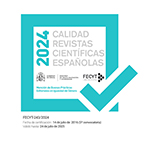Migración y ciudadanía. La lógica de la asignación de derechos en la acción social
Resumen
Exponemos las aportaciones de la reflexión antropológica acerca de la relación entre las formas de inclusión de la población inmigrante en España y el reconocimiento de los DESC y la ciudadanía. Asistimos al tránsito de la idea clásica de “ciudadanía social” de Marshall basada en la universalidad de derechos a una visión segmentada del acceso a los derechos en un contexto global neoliberal, en el cual la ciudadanía se convierte en un mecanismo de exclusión y no de inclusión. Describimos la producción de la alteridad del inmigrante pauperizado y peligroso, que dan paso a su inclusión diferencial. En ese proceso clasificatorio el ordenamiento jurídico y la gestión institucional juegan un papel clave, legitimadas mediante los discursos de la escasez y la seguridad. Así, reflexionamos sobre la función del trabajo social en este contexto y la tensión entre modelos dirigidos al control social frente a otros que emplean lógicas transformadoras y de lucha por la equidad y la justicia social.
Descargas
Descarga artículo
Licencia
La revista Cuadernos de Trabajo Social, para fomentar el intercambio global del conocimiento, facilita el acceso sin restricciones a sus contenidos desde el momento de su publicación en la presente edición electrónica, y por eso es una revista de acceso abierto. Los originales publicados en esta revista son propiedad de la Universidad Complutense de Madrid y es obligatorio citar su procedencia en cualquier reproducción total o parcial. Todos los contenidos se distribuyen bajo una licencia de uso y distribución Creative Commons Reconocimiento 4.0 (CC BY 4.0). Esta circunstancia ha de hacerse constar expresamente de esta forma cuando sea necesario. Puede consultar la versión informativa y el texto legal de la licencia.









